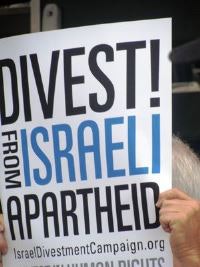
It was time for a ritual that has become increasingly commonplace on many American college campuses: a student government body, in this case at the University of California, Davis, would take up Israeli policy toward the Palestinians, and decide whether to demand their school divest from companies that work with the Jewish state.
In the United States, Israel’s closest ally, the decade-old boycott-divestment-sanctions, or BDS, movement is making its strongest inroads by far on college campuses. No U.S. school has sold off stock and none is expected to do so anytime soon. Still, the current academic year is seeing an increasing number of divestment drives at colleges and universities, stretching from the University of California system to Northwestern University and beyond. Since January alone, student governments at four universities have taken divestment votes.
While the campaigns unfold around resolutions largely proposed by chapters of Students for Justice in Palestine, outside groups have become increasingly involved — from American Muslims for Palestine and the Quakers’ American Friends Service Committee, on one side, to the American Israel Public Affairs Committee, or AIPAC, on the other. At some campuses, candidates for student government are being asked their views on the Israeli-Palestinian conflict. The heated rhetoric has led to claims of anti-Semitism and of infringement on free speech.
“I don’t think anyone is surprised when they hear a BDS movement is coming,” Ira Stup, a 2009 Columbia University graduate and former director of J Street U, the college arm of the liberal pro-Israel lobby J Street, which opposes BDS. “It’s becoming a regular occurrence.”
“It’s creating a debate. It’s creating a significant amount of conversation in the entire community and it’s set on the terms the activists want it to be set on,” said Rahim Kurwa, a doctoral candidate and member of Students for Justice in Palestine at the University of California, Los Angeles.
The boycott-divestment-sanctions movement grew from a 2005 international call from Palestinian groups as an alternative to armed struggle over control of the West Bank, Gaza and east Jerusalem, which Israel captured in 1967 and Palestinians seek for an independent state.




















